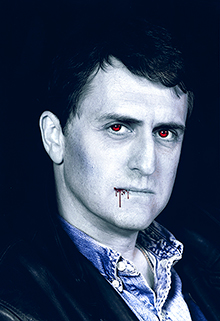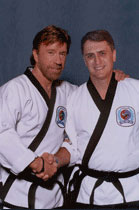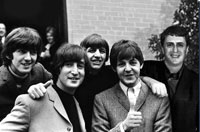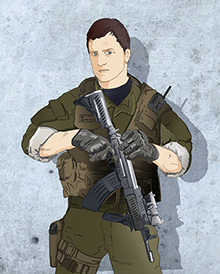How I Work - Stephen Leather

There was a time, not so long ago, when I lived in Duke Street, opposite the Duke pub in the centre of Dublin. Outside my window every summer evening the Dublin Literary Pub Crawl would start its journey around the city’s pubs. The Irish literary greats – Joyce, Beckett, Wilde – were discussed with vigour and humour by two actors, and the pub crawl is still a must-do for tourists.
But in all the time that I lived in the city (almost twenty years), never once did a tour guide point up at my flat and say – 'and this is where thriller writer Stephen Leather is working on his latest bestseller.'
But during my first twenty years as a full time writer, that’s how I worked. I delivered a book at the end of June and every May, like an elephant returning to die, I would retreat to my one-bedroom flat in Dublin to finish whatever book I was working on.
I would unlock the front door and make my way up the stairs, laden with bags of microwaveable food from the Marks and Spencer food hall in Grafton Street. I would open my laptop and start to write. And that’s all I would do for the next three or four weeks, rushing to meet my deadline.
I always liken writing a book to riding a rollercoaster. Back then a book took me a year, pretty much, from start to finish. I would spend the first three months dithering about whether or not to get on the rollercoaster. I would meet contacts, I read, I trawled the internet. I would go drinking with cops, spies and villains, looking for characters and plots to use in the book. That’s what most writers call research but in my case it’s just me postponing the moment when I start to write.

I tend not to make notes while I’m researching, maybe just the odd scribble on a Post-It note. I do rip cuttings from newspapers and magazines, and use a highlighter on passages in books that interest me. When I do write I tend to give each character an index card and make notes about their characteristics. That way when I write a scene with several characters interacting, I have the cards next to me so that I can easily recall hair colour, favourite drink, jewellery, type of watch, all the niggling details that are so easy to forget.
Before I became a full-time fiction writer, I was journalist. I wrote my first book –Pay Off – while I was working for the Daily Mirror newspaper in London, and I wrote my second and third – The Fireman and Hungry Ghost – during a three-year stint in Hong Kong as Business Editor of the South China Morning Post. But it was only after I wrote The Chinaman while working for The Times in London that I started writing full-time. And for the first twenty years of my writing career I had only the one deadline – to deliver a book by the end of June.
Journalists are famous for always meeting deadlines at the last minute, and I’m no exception. Even when I finally did open my laptop computer and start to write, I would only do four or five hundred words a day, equivalent to just over a page. I didn’t write every day, and it wouldn’t be unusual for a week or two to go by without me opening the laptop. This period of writing is the rollercoaster equivalent of the long haul to the top. I would laying down the plot, defining the characters, setting the scene. It was actually hard work and not much fun. In May each year, as my deadline loomed, I would lock myself away in my flat in Dublin. While I was writing, I wouldn’t answer the phone or the doorbell. My friends knew that there was no point in trying to contact me in May or June. It’s the rollercoaster equivalent of hurtling down the ride and once I reached that point there was no stopping me. It’s the part of writing that every writer loves, the point where you’re so involved in the story that it becomes real, where the characters take on a life of their own and where all the writer is doing is describing what’s happening. It’s the point where my characters start speaking with their own voices and they surprise me and make me laugh at the things they say. I love it. It’s what I live for.

But that was when, back in what some writers think of as the golden age of publishing. Writers were expected to deliver a book once a year. If you offered a second, generally it would be refused with a smile, or the suggestion that you publish it under another name. There was a rhythm to publishing. You wrote a book and it would be published almost a year later as a hardback, at which time you would be delivering the new book. The new book would then be published the following year as a hardback, and the old book would be reissued as a paperback. That’s how almost all writers worked.
So what changed? Publishing did. In fact it didn’t just change – it was revolutionized. By the arrival of eBooks, and in particular by Amazon and their Kindle eReader.
Now printers, distribution networks, warehouses and shops are no longer necessary to sell books. Readers can download books straight to their eReaders, and now that shelf space is no longer an issue, writers are no longer tied to one book a year. In fact in the bold new world of ePublishing, writers are encouraged to be as productive as possible.

In my case, I write two books a year for my publisher, Hodder and Stoughton, then I write at least one more novel which I self-publish, plus as many as half a dozen short stories. Whereas I used to write about 120,000 words a year, now my output is closer to 350,000. Yes, I now write three times as many words a year as I used to. That’s one heck of a jump in productivity. And I don’t live in Dublin any more. The credit crunch put paid to that, I’m afraid. Now I write wherever in the world I find myself.
I’ve always written with the television on, typing on my laptop which I put on the coffee table while I sit on the sofa. I’ve always worked with the television on. I was brought up in a house with four younger siblings so silence is an anathema to me. My working life as a journalist was spent in busy newsrooms and now the only time I need silence is when I sleep. The rest of the time I have the television on constantly.
Apart from the background noise, television is actually a big help creatively. Say I need a type of car for a character to drive. There’s bound to be a car on TV that I can use. Say I need the name for a new character. I wait until credits start to roll on a TV show and I get dozens of possible names. If I have to describe what a character is wearing, a few minutes watching a film or a soap opera will give me lots of possibilities.
The downside of working on the coffee table is that it plays havoc with my spine. In 2007 I started to get pains in my arms and it got worse in 2008. My GP prescribed anti-inflammatories and for a while they worked, but the pains kept coming back, coupled with frequent pins and needles in my hands. Eventually I went to a physiotherapist – a great guy who used to work on the New Zealand test cricket team. He reckoned that my working position was causing the pain, and that bending over the keyboard for twenty-odd years was finally taking its toll. That and the fact that I tend to sleep on my front with my head to the side. Anyway, he encouraged me to raise the keyboard and to keep my back straight as I type and it seems to have done the trick. Do I miss the golden age of publishing? The days when I was expected to produce one book a year? Not really. I enjoy stretching myself creatively, and I welcome the opportunity to tell more stories. If you want to know what I’m working on now, Click here to see my Blog
Equipment

I wrote my first book, Pay Off, partly by hand and partly on a manual typewriter in the offices of the Daily Mirror, but to submit it to publishers, the manuscript had to be typed so that meant retyping the whole thing into an IBM ‘golfball’ typewriter. It had a memory equivalent to about eight pages, which meant I typed in eight pages, printed out six copies, then deleted the copy and typed in the next eight pages. It took weeks. Many writers still write by hand - Jeffery Archer for instance - and there’s no doubt that you tend to put more thought into what you’re writing. But most write on computers, which is how I do it now. It’s faster, easier to make changes, and easier to check things like spelling. Just don’t forget to make back-up copies of all your work!
Hungry Ghost was the first book I wrote on computer, an old Toshiba portable that weighed about 5 kilos and which had to be plugged into the mains to work. I used a word processing program called Xyrite, which isn’t around any more. It was a simple DOS program that mimicked the screen of an Atex computer which is what I was using as a journalist on the South China Morning Post.
I stuck with Xyrite right through until The Bombmaker, then switched to Word, mainly because there was no new version of Xyrite available and the version I had was more than a decade old. I resent the fact that every time I buy a new laptop I have to buy a new version of Windows, and I also resent paying for Word. Word really should come as part of Windows, in my opinion. Why sell me an operating system without a word processor? It would be like buying a car without a steering wheel. Ditto having to pay for anti-virus programs, when pretty much all viruses exploit weaknesses in the Windows operating system. I know that using pirated software is wrong, but considering the thousands of dollars Microsoft has taken from me over the years, I think I’m entitled to a free copy of Word. And don’t think I’m immune from the perils of piracy. A German guy in Pattaya has pirated my book Private Dancer and makes a living, of sorts, by selling it to second hand bookshops around town. I doubt that he makes more than a few hundred dollars a year, so good luck to him!

I write screenplays on Final Draft, which is a great program and which takes all the hard work out of formatting scripts. I have used several Toshiba laptops, the latest being a Pentium II Satellite 4015CDT, but I had several problems with it and didn’t get much help from the company’s Customer Service department (at the time they had no e-mail address for enquiries, no phone number for instant help, and the machine had to be sent to Germany to be repaired.) After sending it to Germany three times, I relegated the machine to back-up status and bought a Pentium 1 Sony PCG-745. Great machine, and in the early days Sony’s Customer Service was excellent - you phoned a number and talked to a guy called Dave who was ace at solving problems. These days Sony’s computer division has got much bigger and it has a huge Customer Service section staffed by not very bright people. I’ve no idea what happened to Dave, but I miss him! I bought a Pentium 3 Sony PCG-F707. Also an excellent machine, but I had several disappointing e-mails from Customer Services (about connecting to the Internet via a mobile phone) and for that reason I’m loathe to recommend Sony any more. Each e-mail came from a different person, often unidentified, and each time I had to describe the problem from scratch. After twenty e-mails the matter was still unresolved. Frankly, these days hardware is pretty much the same no matter what brand you get. Best choose a retailer that offers decent Customer Service. In the UK I use Currys. Can’t fault them.
I lost patience with Sony in 2009/2010. I paid £750 for a Sony Vaio and it was a disaster. It developed several keyboard faults and had to be repaired three times, and the battery life went from just under two hours to less than thirty minutes in under six months. I paid more the £100 for a new extended battery but even that slowed down quickly. Battery life has always been a problem with Sony laptops and I don’t understand why they haven’t addressed it.
There is also an ongoing software problem which means that after a year or so the computer slows down to a snail’s pace, no matter how often you clean and reformat your hard disc. Booting up and booting down times get longer and longer and you spend almost an hour a day with the machine telling you that such and such a program is not responding. It has happened with every Sony laptop I’ve bought in the last six years. I don’t know if it’s a Sony problem or a Microsoft problem, but frankly it doesn’t matter. It’s the end result that matters, and the simple fact is that after a year the Sony just does not perform. I write for a living so very minute that I spend with ‘not responding’ on screen is money wasted.

I bought a MacBook Pro in the summer of 2009, and in the spring of Summer 2010 I started using it full time. Nightfall was the first book I wrote completely on my MacBook and I don’t think I’ll ever go back to Windows.
I can’t praise the MacBook enough and wished that I had switched years ago. The battery life is out of this world – even after almost two years I was getting between six and seven hours on a single charge. Awesome. I bought a new MacBook in 2013 and it’s even better than my first one, superfast with what they call a retina screen. MacBooks never freeze. Ever. Whereas my Sony would freeze once a day and go into ‘not responding’ mode at least a dozen times. And I haven’t been hit by a single virus. There are only two small gripes. The keyboard takes a little getting used to as the keys are quite far apart, and it couldn’t handle Word files. I had to buy a Microsoft Office for Mac, and I do resent giving Microsoft more money because I was buying Windows pretty much every 18 months during my Sony days.
I’m still loyal to Sony brand, though, I just won’t buy another Sony laptop. I have two Sony digital cameras, four Sony LCD TVs, three Sony DVD players, two portable Sony DVD players and a Sony Playstation 2. If Sony built a car I’ve no doubt that I’d drive one!
I had three Brother printers, an HL-1250, an HL-1040 an HL-820 and all three were relatively problem free. I used to have a Panasonic KX-P4420 which was slow but reliable and the size of a small tank. I did try a Lexmark printer but it was forever going wrong so I threw it out. I bought a Hewlett-Packard PSC 500 which is a combined printer, scanner and photocopier. Clever machine and well worth the money but the paper feeder was slightly off centre from the day I bought it. Now I use Hewlett Packards, usually the HP1300 Series combined printer/scanner/copier. They are reliable and produce good quality copies but I am forever having to change the toner cartridges. I think per weight, toner is now one of the most expensive commodities around, certainly more expensive than gold and oil.



